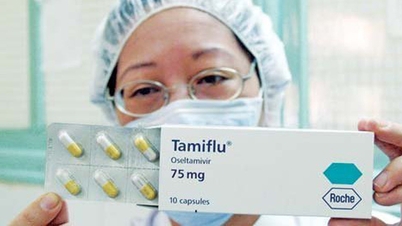Hospitalized for influenza infection due to self-medication with Tamiflu

Arbitrarily using Tamiflu to treat flu at home, the patient developed complications of secondary flu infection and had to be hospitalized (illustrative photo).
Not only the elderly or people with underlying diseases, flu can also cause dangerous complications in healthy young people. Ms. NNP (30 years old, Hanoi ), 4 days before being hospitalized, the patient had a high fever with headache, sore throat, cough with phlegm, runny nose, and body aches. After testing for flu at home and getting a positive result, Ms. P took Tamiflu for 2 days. However, the high fever and fatigue forced Ms. P to go to the Tropical Diseases Department, E Hospital for examination.
Here, Ms. P was diagnosed with influenza B infection and was prescribed antibiotics, antivirals, combined with supportive measures such as cough suppression, fever reduction, and electrolyte replacement. According to the treating doctor, this case shows that even young people with a history of good health should not be subjective with influenza, especially when the disease progresses for a long time or shows unusual signs.
Also here, Ms. NTT (73 years old, from Hanoi) was hospitalized with a prolonged high fever, cough with phlegm, sore throat and fatigue. Four days before, Ms. T had flu symptoms but bought medicine on her own instead of going to the doctor. When the disease became more severe, Ms. T went to E Hospital for examination and was diagnosed with influenza A infection. At the hospital, the patient was treated with antibiotics, anti-influenza virus combined with supportive measures such as cough suppressant, fever reducer and electrolyte replacement.
MSc. Dr. Dinh Thi Bich Thuc, Department of Tropical Diseases, said: Since January 2025, the Department of Tropical Diseases has received and treated about 250 cases of influenza of all kinds. However, after the Lunar New Year 2025, the number of influenza cases coming for examination and treatment has tended to increase, with an average of about 10 influenza patients per day.
Young and healthy people should not be subjective with the flu.
Dr. Thuc emphasized: At peak times, doctors at the Tropical Diseases Department examine nearly 40 patients a day, of which more than half have the flu. Notably, not only the elderly, children or people with underlying diseases (cardiovascular, diabetes, respiratory, etc.) but also young, healthy people are at risk of getting sick and experiencing complications if they are subjective. Currently, the Tropical Diseases Department is receiving and treating more than 20 patients with various types of flu.
"Anyone is at risk of getting the flu, but the level of impact will vary depending on the subject. Seasonal flu is an acute respiratory infection caused by the influenza virus, which is transmitted directly from sick people to healthy people through small droplets when talking, coughing, or sneezing. Although many cases of flu can recover on their own, if not treated promptly, the disease can progress severely, causing dangerous complications such as pneumonia, respiratory failure, bacterial superinfection, and even life-threatening in severe cases," Dr. Thuc added.
According to information from the Ministry of Health , in Vietnam, the number of flu cases will increase locally from the end of 2024 and during the Lunar New Year 2025, but there will be no sudden changes compared to previous years. Common influenza virus strains include: influenza A/H3N2, A/H1N1 and influenza B. Currently, the winter-spring weather with high humidity creates favorable conditions for the virus to develop and spread. At the same time, the increased demand for travel, trade and festival activities at the beginning of the year also increases the risk of disease outbreaks...
Doctors warn that people at high risk of dangerous complications from seasonal flu include: Pregnant women at any stage of pregnancy; Children under 5 years old; People over 65 years old; People with chronic diseases such as HIV/AIDS, asthma, heart disease, lung disease and diabetes; People at high risk of flu exposure, including health care workers.
To prevent seasonal flu, the Steering Committee for Epidemic Prevention of E Hospital recommends that people should: Cover their mouth and nose when coughing or sneezing, preferably with a cloth or handkerchief or disposable tissue or sleeve to reduce the spread of respiratory secretions; Wear a mask in crowded places, on public transport; Wash hands regularly with soap and clean water or hand sanitizer (especially after coughing or sneezing); Do not spit indiscriminately in public places; Limit contact with people with flu or suspected cases when not necessary; Get vaccinated against seasonal flu; Practice a healthy lifestyle; eat nutritious foods to prevent influenza virus infection; increase physical activity to improve health.
"When experiencing symptoms of cough, fever, runny nose, headache, fatigue, people should not arbitrarily test and buy medicine to treat at home but should contact the nearest medical facility for timely consultation, examination and treatment," Dr. Thuc especially noted.
Source: https://www.baogiaothong.vn/canh-bao-cum-boi-nhiem-do-tu-dung-thuoc-dieu-tri-tai-nha-192250217103217233.htm





![[Photo] Ready for the top competitions of Vietnamese table tennis](https://vphoto.vietnam.vn/thumb/1200x675/vietnam/resource/IMAGE/2025/5/18/9c547c497c5a4ade8f98c8e7d44f5a41)

![[Photo] Many young people patiently lined up under the hot sun to receive a special supplement from Nhan Dan Newspaper.](https://vphoto.vietnam.vn/thumb/1200x675/vietnam/resource/IMAGE/2025/5/18/6f19d322f9364f0ebb6fbfe9377842d3)



















![[Photo] General Secretary To Lam visits exhibition of achievements in private economic development](https://vphoto.vietnam.vn/thumb/1200x675/vietnam/resource/IMAGE/2025/5/18/1809dc545f214a86911fe2d2d0fde2e8)



































































Comment (0)